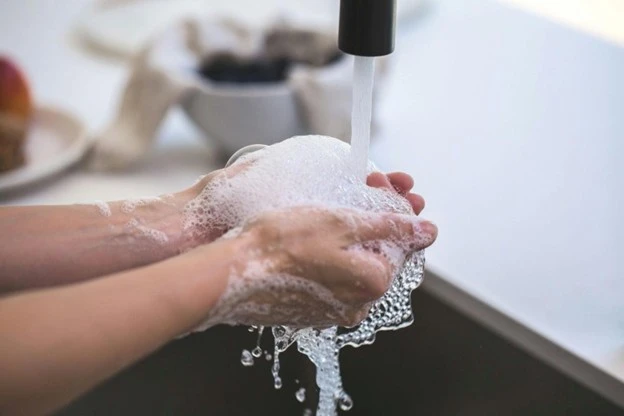Every year, disposable period products generate an estimated 200,000 tonnes of plastic waste worldwide. According to the EPA, plastic generation in the United States alone was 35.7 million tons in 2018.
Most of this waste comes from the synthetic fibers and plastic films hidden inside familiar pads and wipes, creating a massive environmental burden. Fortunately, planet-positive options now let us care for our bodies without compromising the Earth.
The Plastic Waste Problem: Why Conventional Products Fail Us
Conventional wipes and pads are engineered for convenience, not decomposition. Many disposable pads contain up to 90% plastic, and a single polyester-blend wipe can persist for 500 years, slowly fragmenting into microplastics.
Beyond this landfill legacy, these products often contain fragrances and dyes that can disrupt vulvar pH and provoke irritation. In short, they’re tough on ecosystems and not always gentle on intimate skin.
| Key Insight: Conventional wipes don’t just disappear; they fragment into microplastics over 500 years. The convenience of today creates a permanent pollution problem for our ecosystems and even our bodies. |
Sustainable Solutions for Period Care
Biodegradable feminine wipes, such as gentle, pH-balanced menstrual wipes from nixit, use fast-renewing plant fibers like bamboo viscose or certified organic cotton. When composted correctly, they return to the soil in weeks rather than centuries.
Clean Skin Club’s compostable clean towels made from similar fibers add another layer of eco-hygiene for pure, absorbent sheets that are versatile and planet-friendly.
Conventional vs. Eco-Friendly at a Glance
| Feature | Conventional Plastic Wipes | Biodegradable Feminine Wipes | Reusable/Compostable Clean Towels |
|---|---|---|---|
| Base Material | Polyester blend | Bamboo viscose/wood-pulp | Organic cotton/lyocell |
| Decomposes In | 500+ years | 4 – 12 weeks (industrial compost) | N/A (wash) or < 8 weeks (compost) |
| Skin Safety | Often fragranced, dyed | Fragrance-free, dye-free | Dye-free, hypoallergenic |
| Certifications | Rare | FSC, OK Compost, OEKO-TEX | GOTS, OEKO-TEX |
| Plastic Content | 80 – 90 % | 0 % | 0 % |
Material Deep-Dive: Which Fibers Make the Cut?
Bamboo Viscose
Bamboo shoots can grow up to 91 cm in a single day, need no replanting, and naturally fight bacterial growth. Processed into viscose or lyocell through closed-loop systems, bamboo yields ultra-soft, lint-free wipes.
Organic Cotton
GOTS-certified cotton bans synthetic pesticides and GMOs, safeguarding farmworkers and groundwater. Its long fibers feel familiar and gentle against sensitive skin.
Wood-Pulp Lyocell
Derived from sustainably managed forests, lyocell relies on non-toxic amine oxide solvents that are recovered at a 99% rate. This process minimizes chemical discharge into the environment.
Label Literacy
Look for clear percentage breakdowns like “100% bamboo viscose,” third-party seals such as OK Compost HOME, and transparency around any chemical processing involved.
| Pro Tip: When shopping, look past marketing claims. Seek third-party certifications like ‘OK Compost HOME’ or ‘GOTS’ and a clear ‘100% bamboo viscose’ label to ensure a product is genuinely plastic-free and eco-friendly. |
Safety First with Chemical-Free Credentials
Even “unscented” conventional wipes may hide masking fragrances. Eco-alternatives skip dyes and synthetic perfumes, maintaining a skin-friendly pH (between 3.5 and 4.5) that preserves crucial microbiome health.
This is especially important, as a recent study found some reusable feminine products can contain per- and polyfluoroalkyl chemicals (PFAS), making certifications that test for harmful substances essential. Individually wrapped wipes reduce cross-contamination, while multi-purpose towels excel at blotting excess oil or acting as a sanitary barrier.
Pioneering a Plastic-Free Future
Many companies are emerging with a clear mission to end the trade-off between convenience and conscience. This industry leadership, focused on certified materials and carbon-neutral shipping, shows that wellness doesn’t have to be wasteful. Consumers can look for brand impact reports to see how their choices contribute to positive change.
Responsible Use & End-of-Life Tips
- Composting: Industrial facilities can break down bamboo or cotton wipes in under 12 weeks. If you home-compost, shred used wipes and layer them with food scraps for aeration.
- Washing Reusables: Rinse reusable towels promptly, launder on a cold cycle with mild detergent, and skip fabric softener. Line-drying is the most energy-efficient option.
- Travel Hacks: A single compostable towel can replace cotton rounds, paper tissues, and face cloths, cutting both luggage weight and waste.
- Bulk Mindfully: Subscription bundles can slash packaging per unit and guarantee you never have to resort to plastic-packed store brands in a pinch.
| Important: Biodegradable doesn’t mean it disappears in a landfill. For wipes to break down quickly, they require industrial or proper home composting conditions. Simply trashing them negates much of their environmental benefit. |
Inclusive & Workplace Applications
Sustainable period care belongs in every restroom, whether public, corporate, or gender-neutral. HR teams can pilot eco-hygiene kits that include reusable cups, compostable liners, and biodegradable wipes. Setting up supply partnerships ensures consistency and reinforces a company’s environmental, social, and governance (ESG) goals.
The Future of Sustainable Hygiene
The certification landscape is expanding, with labels like EPA Safer Choice now evaluating wipe formulations. On the materials front, mycelium (mushroom) fibers and marine-degradable bioplastic films are becoming more scalable. Yet progress ultimately hinges on consumer action. Every purchase of certified, low-impact products signals a clear demand for planet-positive innovation.
Making the Switch to Conscious Self-Care
Sustainable intimate care safeguards our waterways, slashes landfill load, and keeps sensitive skin free from unnecessary chemicals. Whether you start with reusable towels, switch to certified biodegradable wipes, or adopt both, each eco-upgrade leaves a lighter footprint. Turning everyday hygiene into everyday activism is a powerful way to contribute to a healthier world.
